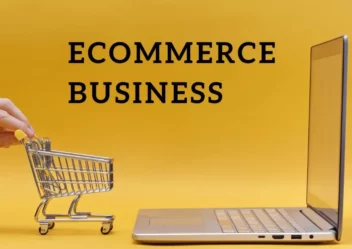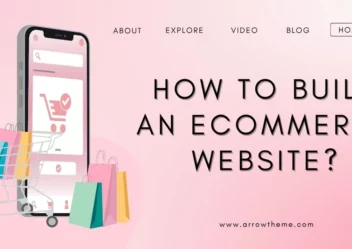9+ Tips for Selling on Social Media eCommerce
Social media isn’t just for likes and shares anymore—it’s a thriving marketplace where your next customers are waiting. With over 40% of consumers discovering new products on social feeds and millions already purchasing directly through these platforms, the potential for eCommerce is undeniable.
If you’re not leveraging social media to sell, you’re missing out on a massive opportunity. This guide will reveal the secrets to social media eCommerce success, providing actionable tips to turn your social presence into a revenue-generating powerhouse. Whether you’re a seasoned seller or just getting started, prepare to leverage the power of social media and watch your sales rise.
Lusion – Multipurpose eCommerce Shopify Theme
We provide an amazing Shopify theme with fast and responsive designs. Let’s find out!
What Is Social Media eCommerce?
Social media eCommerce involves using social media platforms to promote and sell products or services. It leverages the extensive reach and engagement of social networks to connect with potential customers and drive sales.
This approach encompasses various strategies, including:
- Product Discovery: Showcasing products through eye-catching posts, stories, and ads on platforms like Instagram, Facebook, or Pinterest.
- Brand Building: Engaging with followers, sharing behind-the-scenes content, and fostering a community around the brand.
- Social Proof: Encouraging user-generated content, reviews, and testimonials to build trust and credibility.
- Direct Sales: Enabling purchases directly within the social media platform through features like shoppable posts or integrated storefronts.
- Traffic Generation: Directing users to the company’s website or online store through links in social media bios or posts.
Social media eCommerce plays a significant role in the modern consumer journey, influencing how shoppers discover, research, and ultimately purchase products.
3 Ways to Use Social Media for eCommerce
Social media is a powerful tool for eCommerce businesses. Here are three key ways to leverage it:
- Targeted Advertising: Social media platforms offer incredibly sophisticated ad targeting capabilities. You can reach users based on demographics, interests, behaviors, and even past purchase history. This makes it possible to put your products directly in front of the people most likely to buy them.
- Social Selling and Shoppable Posts: Many platforms (like Instagram, Facebook, and Pinterest) now allow you to tag products directly in your posts and stories. This makes it incredibly easy for users to click and purchase what they see, reducing friction in the buying process.
- Building Community and Engagement: Don’t just use social media as a broadcast channel. Interact with your audience! Respond to comments, ask questions, run contests, and encourage user-generated content. This can foster a sense of loyalty and turn your followers into passionate brand advocates.
Why Social Media eCommerce is Essential for Your Business Growth
Social media is more than just a platform for sharing photos or personal updates. It’s a dynamic marketplace where businesses can thrive. Here’s why it’s crucial for your brand:
- Tap into a Global Audience: With billions of active users across various platforms, social media gives you unparalleled access to potential customers from all walks of life. It’s your chance to meet them where they already are – scrolling through their feeds.
- Real-Time Feedback Loop: Social media is a two-way street. It’s not just about broadcasting your message; it’s about listening to what your audience has to say. Gain valuable insights into their preferences, pain points, and opinions about your brand. Use this feedback to refine your products and services.
- Competitive Intelligence: Keep a close eye on your competitors’ social media strategies. What’s working for them? What’s not? Understanding the landscape helps you identify your niche and differentiate your brand.
- Cultivate Customer Loyalty: Social media allows you to build relationships beyond transactional interactions. Engage with your customers on a personal level, respond to their comments and questions promptly, and share content that resonates with them. This fosters a sense of community and loyalty.
- Amplify Your Brand: Social media is your megaphone. Create eye-catching campaigns, share behind-the-scenes glimpses of your company culture, and participate in trending conversations to boost your brand visibility and reach.
- Cost-Effective Marketing: While social media does involve some costs (like content creation and community management), it’s generally much more affordable than traditional advertising. Organic reach and engagement can significantly extend your marketing budget.
- Drive Website Traffic: Use social media to share links to your website, blog posts, or product pages. This can increase traffic and potentially lead to conversions.
- Target Your Ideal Customers: Most platforms offer sophisticated targeting options, allowing you to refine your audience based on demographics, interests, and behaviors. This ensures your message reaches the most relevant people.
9+ Tips for Selling on Social Media eCommerce
Craft a Compelling “About” Section (Bio)
In the quest to create engaging social media content, the importance of a well-crafted bio is often overlooked. When potential customers discover your brand on social media, they often turn to your profile to learn more. A clear and concise bio that outlines your offerings and value proposition can pique their interest and encourage them to explore further. Optimize your bio with relevant keywords and utilize the character limits of different platforms strategically.
For instance, a concise Instagram bio with keywords can be complemented by a more detailed Facebook bio that tells your brand story.

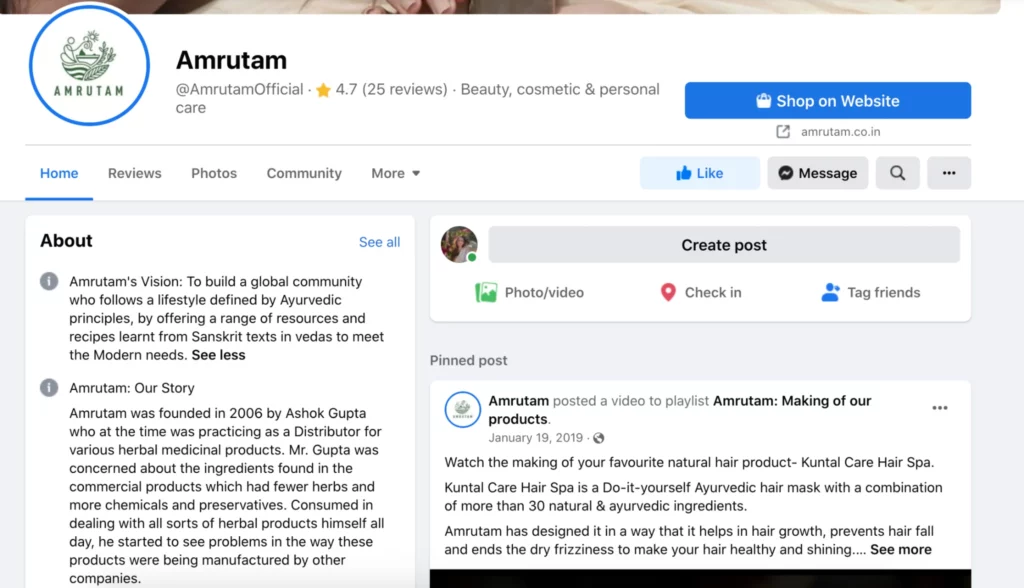
Transform Your Link in Bio into a Shoppable Experience
Many social media platforms limit you to a single link in your bio. Constantly changing this link to match current promotions can be cumbersome. Enter link optimization tools like Linkpop, designed specifically for eCommerce businesses. Linkpop allows you to create a personalized landing page featuring all your current links, ensuring that even older posts lead customers to relevant content.
Moreover, you can create a seamless shoppable link within Linkpop, enabling consumers to add products to their cart and complete purchases without navigating through your entire website. This streamlined approach enhances the user experience and drives conversions.

Embrace Live Shopping
Live content has proven to be highly engaging, and live shopping takes it a step further by enabling direct sales during livestreams. By integrating your social media platforms with your eCommerce backend using solutions like Channelize.io or Livescale, you can create immersive shopping experiences where viewers can ask questions, interact with your brand, and easily purchase featured products.
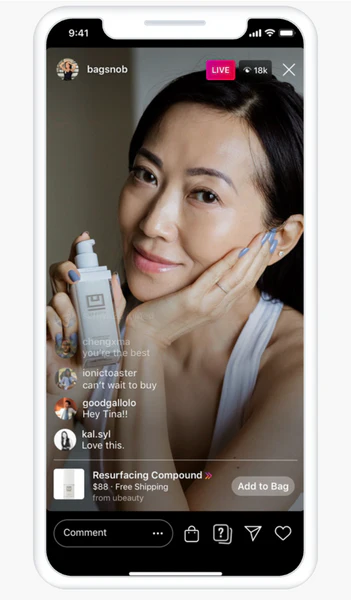
Live shopping generates excitement around new launches or sales, providing a dynamic way to connect with your audience and drive sales.
Transform User-Generated Content into Persuasive Social Proof
Beyond sharing UGC on social media, businesses can harness its power as social proof on their websites. This can be done through Shopify apps that integrate social feeds directly onto the storefront, showcasing real customers using and enjoying products.
Another approach is to collect UGC on the website itself using tools like Judge.me or Loox, allowing customers to upload photos and videos alongside reviews, creating a visually engaging and trustworthy experience.
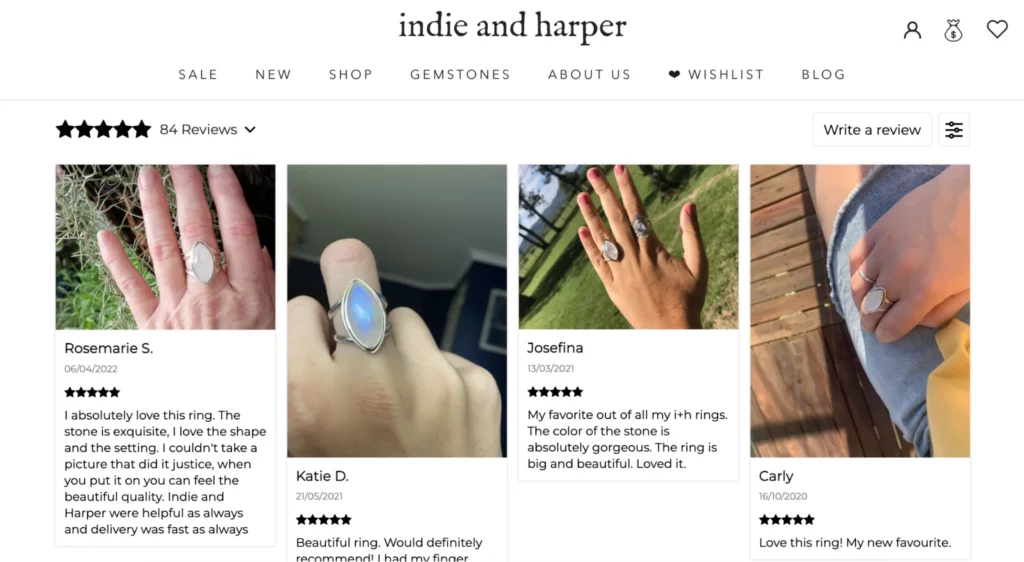
Foster Engagement and Sales through WhatsApp Links
For businesses already using WhatsApp for marketing or customer support, WhatsApp Business links can be a valuable tool. These custom links, shared on social media posts and stories, encourage followers to engage with the business directly on the messaging app. By fostering meaningful conversations, businesses can build stronger customer relationships and drive sales.

Turn Social Media Posts into Instant Shopping Opportunities
One of the most effective ways to bridge social media and e-commerce is through shoppable posts. By incorporating direct product links within the posts, businesses make it effortless for users to explore and purchase items without leaving the social platform.
Whether it’s a clickable “shop” bag on Instagram or a tagged product leading to an in-app page with a “View on Website” button, shoppable posts streamline the buying process and enhance the customer experience.
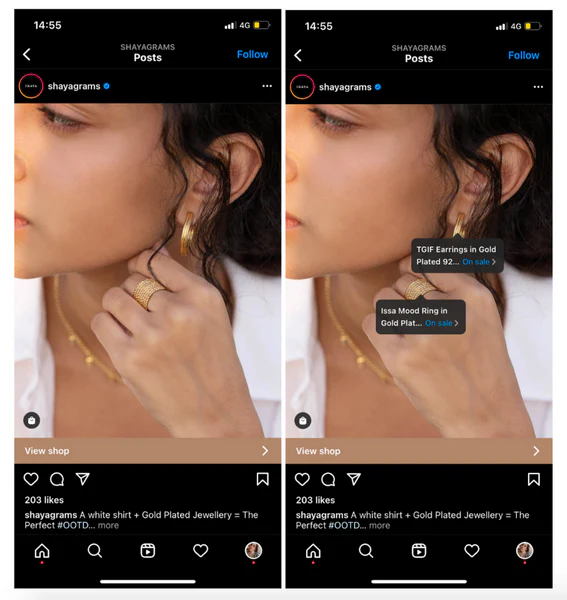

Strategic Social Advertising
Elevate your social media presence by leveraging the potent advertising tools available on most platforms. These platforms often provide sophisticated targeting options, enabling you to reach specific demographics and interests.
For instance, you could target women aged 20-25 residing in New York City with a passion for yoga. When crafting your advertising campaigns, begin with a clear objective: Do you want to guide potential customers to your website, grow your social media following, or encourage direct purchases within the app? Your chosen goal will shape the content of your ads, including both the visual elements and the text. Beauty Pie exemplifies this by offering enticing discounts and free trials to attract new members.
A click on their “Shop Now” button leads to a landing page that consistently reinforces the promotional message.
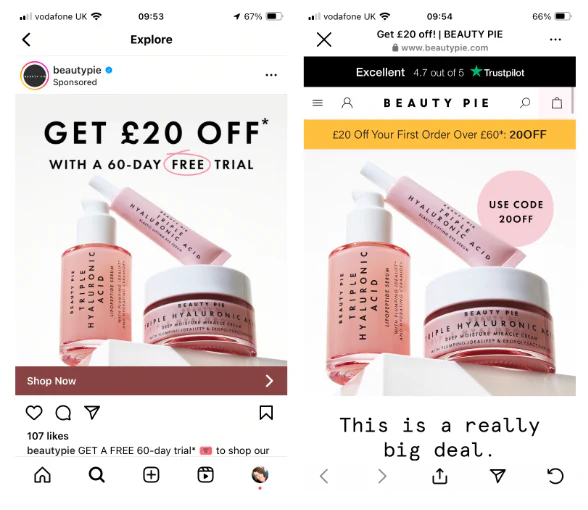
In-Depth Insights Through Social Listening
Social media offers an invaluable space to gather first-hand feedback from your customers through polls, surveys, and by actively listening to conversations about your brand. Set up alerts for your brand and product names to receive notifications whenever someone mentions you. This allows you to promptly address any concerns or leverage positive feedback to strengthen your brand’s reputation and build trust.
Consider engaging in relevant conversations, responding to comments, and participating in industry discussions to further demonstrate your expertise and build relationships with potential customers.
Optimize with Social Media Tools and AI
While social media offers many advantages, it can easily consume your time without a well-defined strategy. Streamline your efforts by utilizing social media tools designed for content creation, scheduling, and engagement. AI-powered chatbots can efficiently handle real-time customer inquiries and address any hesitations they might have about your products.
Integrating your social channels with your e-commerce platform, such as Shopify, centralizes product information, inventory levels, orders, and customer data. Additionally, scheduling tools like Hootsuite, Buffer, or Later enable you to plan and schedule your content for optimal visibility when your audience is most active.
Social Media eCommerce Trends
Social media platforms are evolving into powerful ecommerce hubs, driving sales and shaping consumer behavior through innovative features:
- In-App Shopping: Streamlined storefronts within social apps let customers make purchases directly from their feeds, eliminating extra steps.
- Livestreaming: Live shopping events create excitement and drive sales, offering real-time product demonstrations and Q&A sessions.
- Chatbots: AI-powered chatbots offer instant customer support on social channels, enhancing the shopping experience and building trust.
- Augmented Reality: AR tools are revolutionizing “try before you buy,” allowing customers to experience products through their devices virtually.
- Collaborations: Brand partnerships with creators and influencers expand reach and engage new audiences through authentic content.
- Seamless Multi-channel Experiences: Brands are unifying the buying journey across social media, marketplaces, websites, and email, ensuring a smooth customer experience.
Final Thoughts
We know that managing social media for your eCommerce business can feel overwhelming, but it doesn’t have to be. These tips streamline your efforts, help you work smarter, and ultimately get more out of your social media presence. Now it’s your turn to put them into action and see the difference they can make for your brand.


